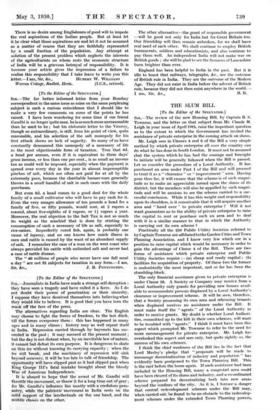To the Editor of the SPECTATOR.] SIR,—The far better informed
letter from Your Bombay correspondent in the same issue as mine on the same perplexing subject is such a curious coincidence that I should like to make a very few comments on some of the points he has raised. I have been wondering for some time if our friend Gandhi is no longer quite sane, he is so much more unreasonable than he used to be ; but his elaborate letter to the Viceroy, though so extraordinary, is still, from his point of view, quite reasonable, and his selection of the salt monopoly for his first attack shows no lack of sagacity. So many of us have constantly denounced this monopoly of a necessary of life as the most objectionable form of taxation. True that 6d. a head per annum, even if it is equivalent to three days' gross income, or less than one per cent., is as small an income tax as could well be imposed, especially when the payment is spread over every day in the year in almost imperceptible pinches of salt, which are often not paid for at all by the extremely poor, because the charitable bazaar-man generally throws in a small handful of salt in such cases with the daily purchases.
But even 6d. a head comes to a good deal for the whole family of a small cultivator who will have to pay cash for it. Even the very meagre allowance of ten pounds a head for a family of five, or fifty pounds, would cost, at 2 rupees a maund, about five-eighths of 2 rupees, or 11 rupees a year. Moreover, the real objection to the Salt Tax is not so much its weight as the mischief that is done by stinting the consumption of such a necessary of life as salt, especially to rice-eaters. Imperfectly cured fish, again, is probably one cause of leprosy, and no one knows how much illness in men and cattle is caused by the want of an abundant supply of salt. I remember the case of a man on the west coast who always provided his cattle with unlimited salt and never had a ease of cattle disease.
The "40 millions of people who never have one full meal a day" are not fit subjects for taxation in any form.—I am,














































 Previous page
Previous page